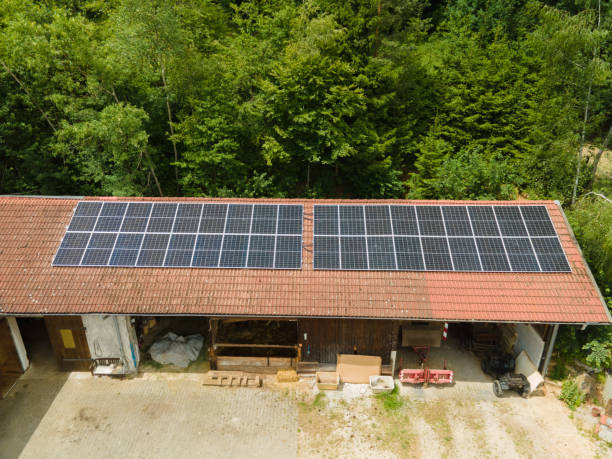Solar Power Grants and Incentives
This post contains affiliate links. I may earn a commission at no extra cost to you if you make a purchase. Note that I’m not a health or outdoor safety professional, so further research is advised. Your support keeps Outdoors A-Z running—thank you! Read the full disclosure.. Read the full disclosure here.
Solar power stands at the forefront of the global movement towards renewable energy sources. As concerns about climate change and environmental sustainability continue to grow, the shift towards solar energy has become imperative. Solar power, harnessed from the sun’s abundant and clean energy, not only reduces our dependence on fossil fuels but also significantly lowers carbon emissions.
Throughout this exploration, we will dissect the various types of grants offered, ranging from government subsidies for residential installations to research and development grants propelling solar technology innovation.
Table of Contents
Types of Solar Power Grants
Solar power grants come in various forms, tailored to meet the diverse needs of individuals, businesses, and communities. These grants serve as financial lifelines, making solar energy installations economically viable for a wider audience. Let’s delve into the different types of solar power grants available:
Government Grants for Residential Solar Installations

One of the most common forms of solar power grants targets individual homeowners. Many governments offer grants or subsidies to homeowners looking to install solar panels on their properties. These grants often cover a portion of the installation cost, significantly reducing the financial burden on the homeowner. By promoting residential solar installations, governments aim to increase the adoption of clean energy at the grassroots level.
Grants for Commercial and Industrial Solar Projects
Businesses and industries play a crucial role in shaping a sustainable future. To encourage these entities to transition to solar power, governments and organizations provide grants specifically designed for commercial and industrial solar projects. These grants support large-scale solar installations on rooftops, parking lots, and even unused land, helping businesses offset their energy costs and reduce their carbon footprint.
Non-profit Organizations and Community Grants
Non-profit organizations and community initiatives are instrumental in driving social change. Recognizing their importance, various grants are available to support solar projects undertaken by non-profits and community groups. These grants empower local communities to harness solar energy for schools, community centers, and public spaces, fostering a sense of environmental responsibility and community engagement.
Research and Development Grants for Solar Technology
Innovation is key to advancing solar technology and making it more efficient and affordable. Research and development grants are allocated to scientists, researchers, and institutions working on groundbreaking solar projects. These grants fuel innovation in solar cell technology, energy storage solutions, and sustainable materials, paving the way for future advancements in the field of solar energy.
Stay tuned as we explore each type of solar power grant in detail, shedding light on how these initiatives are reshaping our energy landscape and driving the global transition towards renewable energy sources.
Types of Solar Power Incentives

In addition to grants, solar power incentives provide compelling reasons for individuals and businesses to invest in solar energy systems. These incentives not only make solar installations financially attractive but also contribute significantly to the growth of the renewable energy sector. Let’s explore the various types of solar power incentives that play a pivotal role in promoting solar energy adoption:
Federal Tax Credits for Solar Energy Systems
Federal tax credits are powerful incentives offered by governments to individuals and businesses investing in solar energy systems. These tax credits allow taxpayers to subtract a percentage of the cost of their solar installation from their federal taxes. By reducing the overall cost, these incentives make solar energy more affordable, encouraging widespread adoption among homeowners and businesses alike.
State-Level Incentives and Rebates
States often provide additional incentives on top of federal tax credits. These state-level incentives come in the form of rebates, tax credits, or performance-based incentives. The nature and availability of these incentives vary from state to state, creating a competitive environment that benefits consumers. State-level incentives further enhance the economic feasibility of solar power systems, making them financially attractive for residents and businesses at the local level.
Net Metering Programs and Feed-in Tariffs
Net metering programs enable solar system owners to receive credits on their electricity bills for the excess energy they produce and feed back into the grid. This encourages the adoption of solar energy by ensuring that owners are compensated for the electricity they contribute to the overall energy supply. Similarly, feed-in tariffs provide a fixed payment for the electricity generated by solar systems. These programs not only incentivize solar installations but also promote a decentralized energy generation model, fostering energy independence and sustainability.
Solar Renewable Energy Certificates (SRECs)

Solar Renewable Energy Certificates (SRECs) offer a unique incentive structure. For every megawatt-hour of electricity a solar system generates, it earns one SREC. These certificates can be sold on the open market, providing additional revenue for solar system owners. SRECs create a market-driven approach, encouraging the production of solar energy and rewarding system owners for their contribution to renewable energy generation.
Property Assessed Clean Energy (PACE) Financing
PACE financing allows property owners to finance the upfront cost of a solar energy system through a special assessment on their property taxes. This innovative financing mechanism eliminates the need for substantial upfront payments, making solar installations more accessible to homeowners. Repayments are made over a specified period, often tied to the property, making it a convenient and affordable way to invest in solar power.
Benefits of Solar Power Grants and Incentives
The widespread availability and utilization of solar power grants and incentives bring forth a multitude of benefits, not only for individuals and businesses but also for the environment and society as a whole. Let’s explore the significant advantages that these financial incentives offer:
Financial Advantages for Individuals and Businesses
One of the most immediate and tangible benefits of solar power grants and incentives is the financial advantage they provide to individuals and businesses. By reducing the initial costs of solar installations, grants and incentives make solar energy systems more affordable. Homeowners experience lower electricity bills, and businesses witness a substantial decrease in operational costs. This financial relief not only encourages the adoption of solar energy but also promotes long-term savings, making it a smart investment choice.
Environmental Benefits and Reduction of Carbon Footprint
Solar power is a clean and renewable energy source that produces electricity without emitting greenhouse gases or air pollutants. By incentivizing the use of solar energy, grants and incentives contribute significantly to reducing carbon emissions and mitigating climate change. Individuals and businesses adopting solar power systems actively participate in the fight against environmental degradation, creating a positive impact on the planet for current and future generations.
Job Creation and Economic Growth in the Renewable Energy Sector
The solar industry is a significant contributor to job creation and economic growth. By promoting the adoption of solar power through grants and incentives, governments stimulate economic activity in the renewable energy sector. Job opportunities arise in various fields, including manufacturing, installation, maintenance, and research and development. This not only enhances employment prospects but also fosters innovation and skills development within the workforce.
Encouraging Innovation and Research in Solar Technology
Financial incentives drive innovation by encouraging research and development in solar technology. Scientists and researchers are motivated to explore new materials, improve energy conversion efficiency, and enhance storage solutions. This continuous innovation leads to the development of advanced solar panels, batteries, and energy management systems, making solar power more efficient and accessible. The cycle of innovation, supported by grants and incentives, ensures that solar technology evolves rapidly, paving the way for a sustainable energy future.
By reaping these benefits, individuals, businesses, and society as a whole are empowered to embrace solar energy solutions, creating a positive ripple effect that extends far beyond individual installations.
Challenges and Considerations

While solar power grants and incentives offer numerous advantages, navigating the landscape of grants and incentives is not without its challenges. Understanding these challenges and considerations is crucial for individuals, businesses, and communities seeking to harness the benefits of solar energy. Let’s explore the key challenges associated with solar power grants and incentives:
Limited Availability and Eligibility Criteria
One of the primary challenges in accessing solar power grants is their limited availability. Government-funded grants often have a set budget, and once these funds are exhausted, new applicants may need to wait for the next funding cycle. Additionally, grants may have specific eligibility criteria based on factors such as location, income level, or type of solar project. Meeting these criteria can be a challenge for some individuals and organizations, limiting their access to these financial incentives.
Complex Application Processes

Applying for solar power grants and incentives can be a complex and time-consuming process. The application paperwork, documentation requirements, and compliance standards can overwhelm applicants, especially those unfamiliar with the intricacies of grant applications. Navigating through the bureaucracy to secure grants requires careful attention to detail and a thorough understanding of the application requirements, posing a challenge for many potential beneficiaries.
Changes in Government Policies and Their Impact
Government policies related to renewable energy and incentives can change over time due to political, economic, or environmental factors. These policy shifts can impact the availability, amount, and eligibility criteria of solar power grants and incentives. Keeping up with these policy changes and understanding their implications is essential for individuals and businesses planning to invest in solar energy. Rapid policy changes can disrupt long-term investment plans, posing a challenge for those relying on stable incentives.
Importance of Understanding Local Regulations and Guidelines
Solar power grants and incentives are often governed by local regulations and guidelines. Understanding these regulations is crucial to ensuring compliance with legal requirements. Failure to adhere to local regulations can lead to delays, financial penalties, or even the cancellation of incentives. Navigating the intricate web of local laws and regulations requires careful research and legal expertise, posing a challenge for applicants seeking to benefit from solar power grants.
Tips for Applying for Solar Power Grants and Incentives
Applying for solar power grants and incentives can be a complex process, but with careful planning and knowledge, individuals, businesses, and communities can navigate the application journey successfully. Here are some valuable tips to consider when applying for solar power grants and incentives:

Research Available Grants and Incentives Thoroughly
Before applying for any solar power grant or incentive, conduct comprehensive research on the available options. Understand the eligibility criteria, application requirements, and deadlines associated with each grant or incentive program. Different grants cater to diverse needs, such as residential installations, community projects, or industrial initiatives. By identifying the most suitable programs, you increase your chances of a successful application.
Seek Professional Advice from Solar Energy Experts
Consulting with solar energy experts or professionals can provide valuable insights into the application process. Experienced solar consultants can help assess your specific needs, guide you through the documentation requirements, and offer recommendations on the most suitable grants or incentives for your project. Their expertise can significantly streamline the application process and increase your chances of securing financial support.
Ensure Compliance with All Application Requirements
Each grant or incentive program comes with specific requirements and guidelines. It is essential to meticulously review these requirements and ensure that your application is complete and accurate. Missing documents or incomplete information can lead to the rejection of your application. Double-check all forms, financial statements, and project details to confirm compliance with the program’s criteria.
Be Aware of Deadlines and Submission Processes
Timeliness is crucial when applying for solar power grants and incentives. Mark application deadlines on your calendar and initiate the application process well in advance. Some programs have rolling deadlines, while others operate on a competitive basis. Understanding the submission process, including online portals or physical submissions, is essential. Late or improperly submitted applications may not be considered, emphasizing the importance of adhering to deadlines and guidelines.
By following these tips and being proactive in your approach, you can enhance your chances of securing solar power grants and incentives successfully. These financial resources can significantly offset the costs of solar installations, making renewable energy solutions more accessible and affordable for individuals, businesses, and communities alike.
Conclusion: Shaping a Sustainable Future with Solar Power Grants and Incentives
In the pursuit of a sustainable future, solar power grants and incentives stand as beacons of hope, guiding individuals, businesses, and communities toward a greener, more environmentally conscious path. Through financial support and incentives, governments, organizations, and communities have empowered countless individuals to embrace solar energy, reducing carbon emissions, lowering energy costs, and fostering innovation in the renewable energy sector.
As you embark on your own solar energy journey, armed with the knowledge of available grants and incentives, remember that your actions have a lasting impact. By choosing solar power, you not only invest in a sustainable energy solution but also become part of a global movement toward a cleaner, greener planet. Your decision to embrace solar energy is a statement—a statement that echoes a commitment to environmental stewardship, economic prudence, and a better quality of life for current and future generations.














